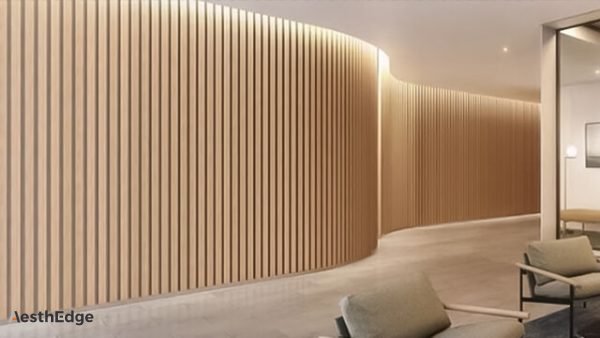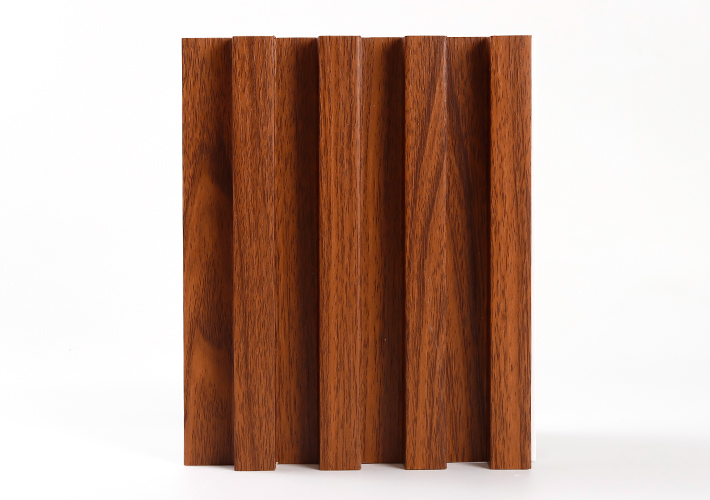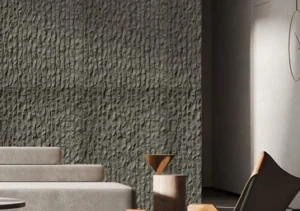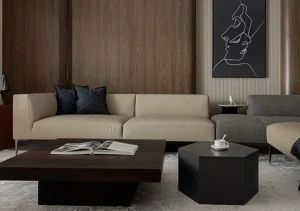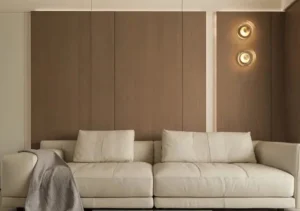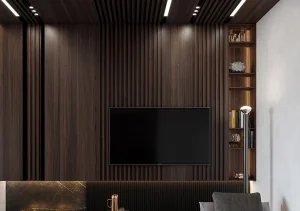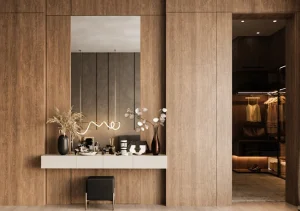When choosing wall panels for construction and interior decoration, two of the most popular materials are PVC (Polyvinyl Chloride) wall panels and WPC (Wood-Plastic Composite) wall panels. Both have unique advantages, and the choice between them depends on factors like durability, application, aesthetics, environmental impact, and cost-effectiveness.
This article provides a detailed comparison of PVC and WPC wall panels from a professional perspective, covering their materials, properties, advantages, applications, and industry trends.
Table of Contents
ToggleUnderstanding PVC and WPC Wall Panels
1.What Are PVC Wall Panels?
PVC wall panels are made from polyvinyl chloride (PVC) resin, combined with additives to enhance strength, durability, and fire resistance. These panels are lightweight, waterproof, and easy to install, making them an excellent alternative to traditional wall coverings such as paint, wallpaper, or tiles.
Key Features of PVC Wall Panels:
- 100% waterproof
- Fire-resistant
- Lightweight and easy to install
- Affordable and cost-effective
- Resistant to mold and termites
- Available in various colors and textures
2.What Are WPC Wall Panels?
WPC wall panels are wood-plastic composites, meaning they are made from a blend of wood fibers (or wood powder) and plastic polymers. This combination creates a more natural-looking product with the durability of plastic. WPC panels are known for their strength, weather resistance, and eco-friendliness, making them suitable for both indoor and outdoor applications.
Key Features of WPC Wall Panels:
- Higher strength compared to PVC panels
- Wood-like texture with natural aesthetics
- Moisture-resistant but slightly less waterproof than PVC
- More environmentally friendly than pure plastic panels
- Longer lifespan and greater resistance to impact
WPC Wall Panels Designs CSW16022
WPC wall panel is an innovative and eco-friendly building material. It combines the durability of wood and the flexibility of plastic.
View MoreComparison Between PVC and WPC Wall Panels
To determine which is better, let’s analyze them based on various technical and functional aspects:
1.Material Composition and Structure
| Feature | PVC Wall Panels | WPC Wall Panels |
| Main Material | Polyvinyl chloride (PVC) | Wood fibers + plastic (PVC or PE) |
| Density | Low (lightweight) | Higher (more solid) |
| Environmental Impact | Synthetic plastic, less eco-friendly | Uses recycled wood, more eco-friendly |
- Verdict: WPC panels are better in terms of eco-friendliness and have a more natural appearance. However, PVC panels are lighter and more waterproof.
2.Durability and Lifespan
| Feature | PVC Wall Panels | WPC Wall Panels |
| Waterproof | Excellent | Good but not as strong as PVC |
| Fire Resistance | High | Moderate |
| Impact Resistance | Moderate | High |
| Lifespan | 10-20 years | 20-30 years |
- Verdict: WPC panels last longer and offer better impact resistance, while PVC panels have superior waterproofing and fire resistance.
3.Aesthetics and Design Flexibility
| Feature | PVC Wall Panels | WPC Wall Panels |
| Surface Finish | Glossy, matte, printed designs | Natural wood-like texture |
| Customization | Limited texture options | Available in wood grain and various finishes |
| Color Variety | Wide range | More natural tones |
- Verdict: If you need a modern, glossy finish, PVC wall panels are ideal. If you prefer a wood-like texture and a more natural look, WPC is the better choice.
4.Cost and Economic Considerations
| Feature | PVC Wall Panels | WPC Wall Panels |
| Initial Cost | Lower | Higher |
| Maintenance Cost | Low | Low |
| Installation Cost | Low | Moderate |
5.Environmental Impact and Sustainability
| Feature | PVC Wall Panels | WPC Wall Panels |
| Eco-friendliness | Made from synthetic plastic | Uses recycled wood, more sustainable |
| Recyclability | Difficult to recycle | Easier to recycle |
| Carbon Footprint | Higher | Lower |
- Verdict: If sustainability is a priority, WPC wall panels are the better option due to their use of natural wood fibers and recyclability.
Application Scenarios of PVC and WPC Wall Panels
Where to Use PVC Wall Panels?
PVC wall panels are commonly used in:
- Bathrooms and kitchens (due to their waterproof nature)
- Ceilings and decorative walls (due to their lightweight design)
- Commercial interiors (shops, offices, hotels)
- Hospital and healthcare facilities (hygienic and mold-resistant)
Where to Use WPC Wall Panels?
WPC wall panels are ideal for:
- Living rooms and bedrooms (due to their natural wood-like appearance)
- Outdoor wall cladding (moisture-resistant but breathable)
- High-end commercial spaces (luxurious wood finish)
- Soundproofing applications (better insulation properties)
Which is the Better Choice?
When to Choose PVC Wall Panels?
✅ You need a waterproof solution for bathrooms, kitchens, or ceilings.
✅ You want a budget-friendly and easy-to-install panel.
✅ You prefer a modern, glossy finish with varied colors and textures.
✅ You require a fire-resistant material for safety.
When to Choose WPC Wall Panels?
✅ You want a more natural wood-like aesthetic.
✅ You need a panel with higher durability and strength.
✅ You prefer an eco-friendly and sustainable material.
✅ You need outdoor wall panels or luxury interior applications.
Industry Trends and Future Outlook
- PVC wall panels continue to dominate the budget-friendly and highly practical market segment.
- WPC wall panels are growing in demand due to the increasing focus on sustainability and premium aesthetics.
- Hybrid materials combining WPC with PVC are emerging to optimize cost and performance.
- Advanced printing technologies allow PVC panels to mimic wood textures more realistically, reducing the aesthetic gap.
Final Conclusion
Both PVC and WPC wall panels have their advantages and ideal applications. PVC wall panels are the best choice for waterproof, lightweight, and cost-effective projects, while WPC wall panels offer greater durability, natural aesthetics, and sustainability.
For residential interiors, PVC panels work well in wet areas, while WPC panels are better for living spaces with a high-end appearance. For commercial and outdoor applications, WPC panels provide better strength and longevity.
Ultimately, the choice depends on your specific needs, budget, and environmental priorities.

